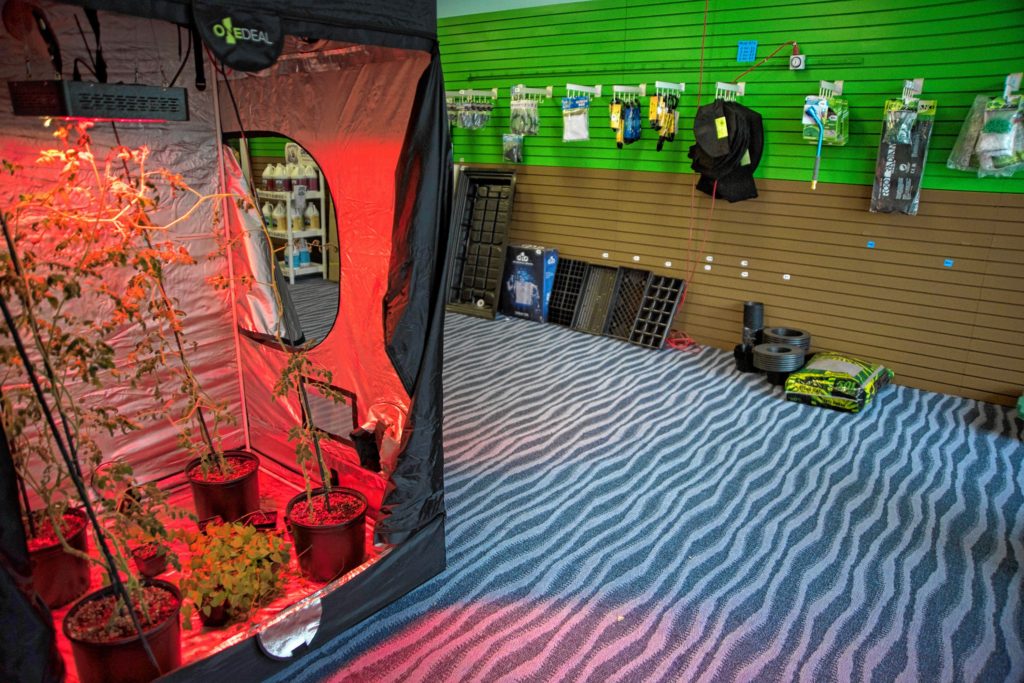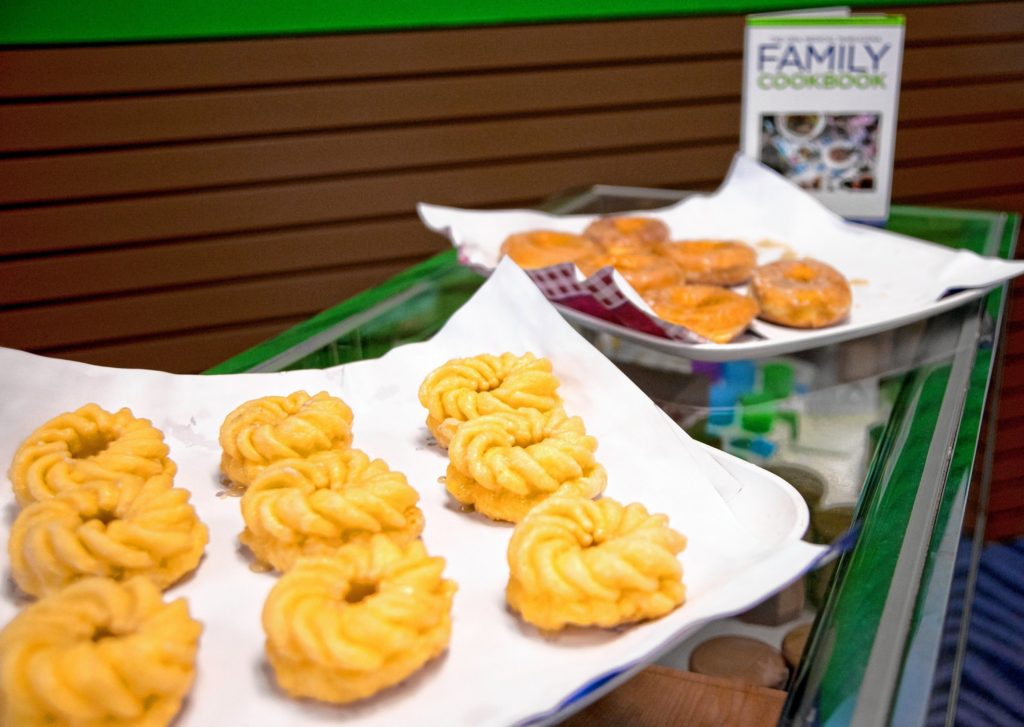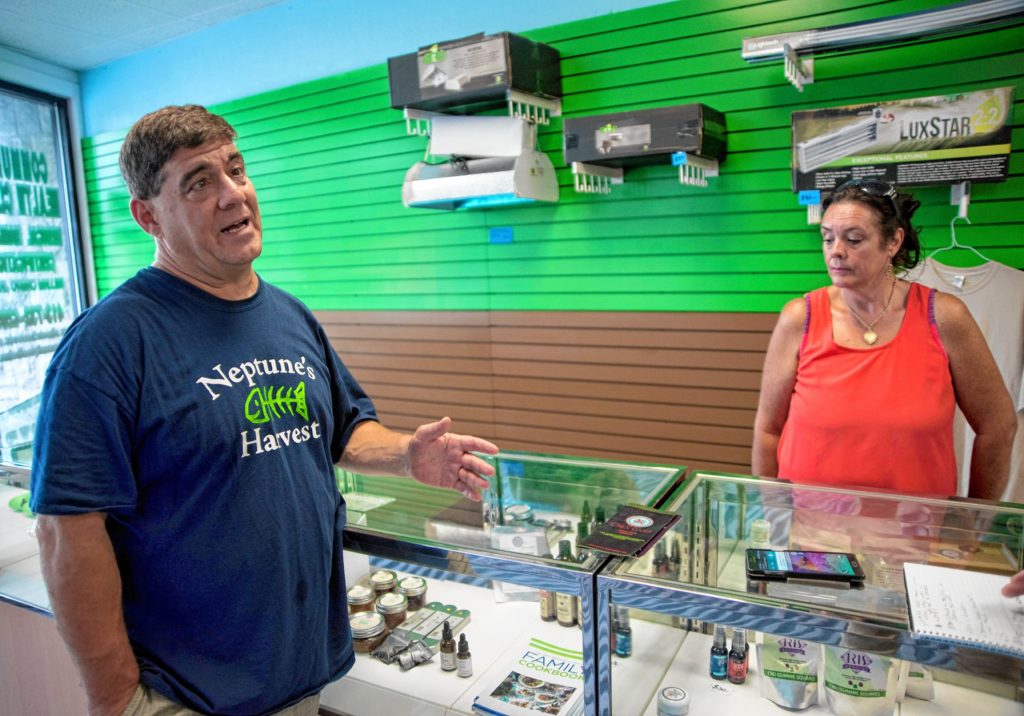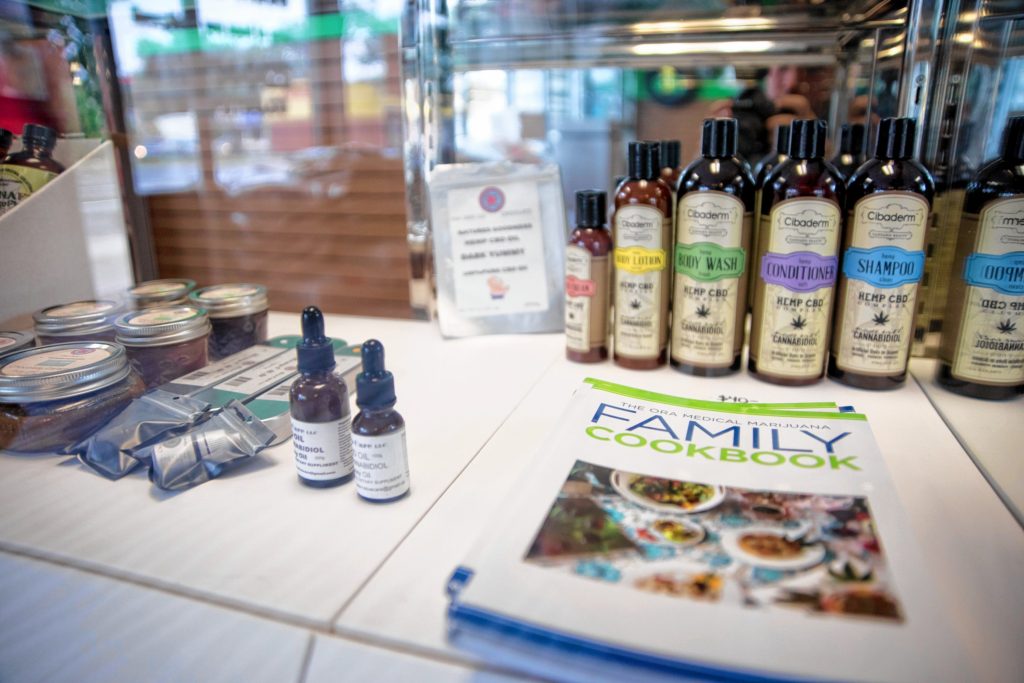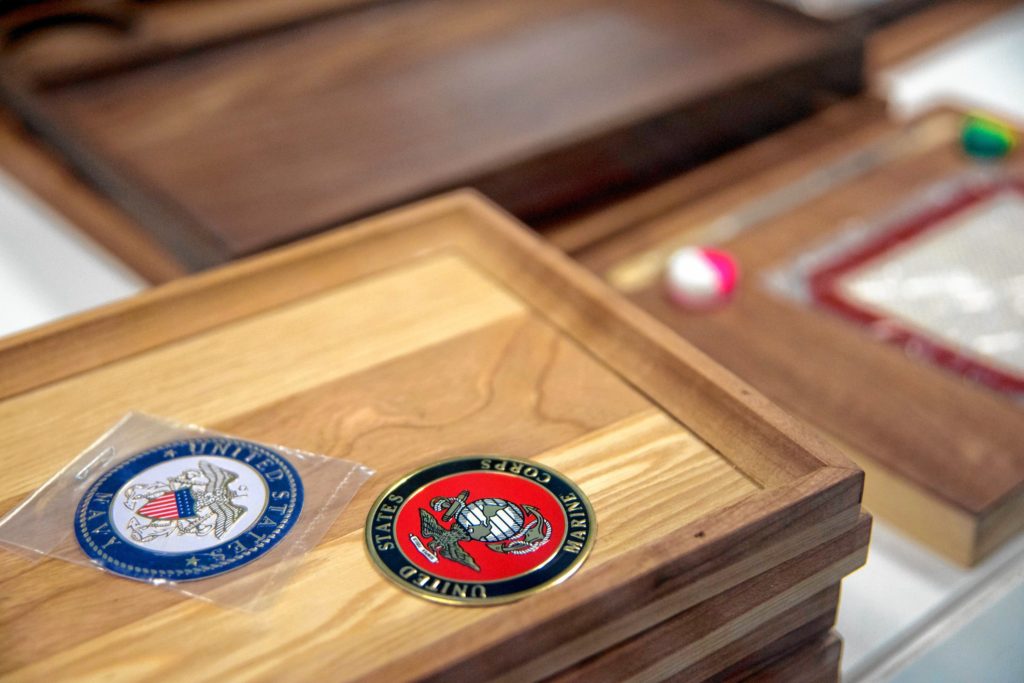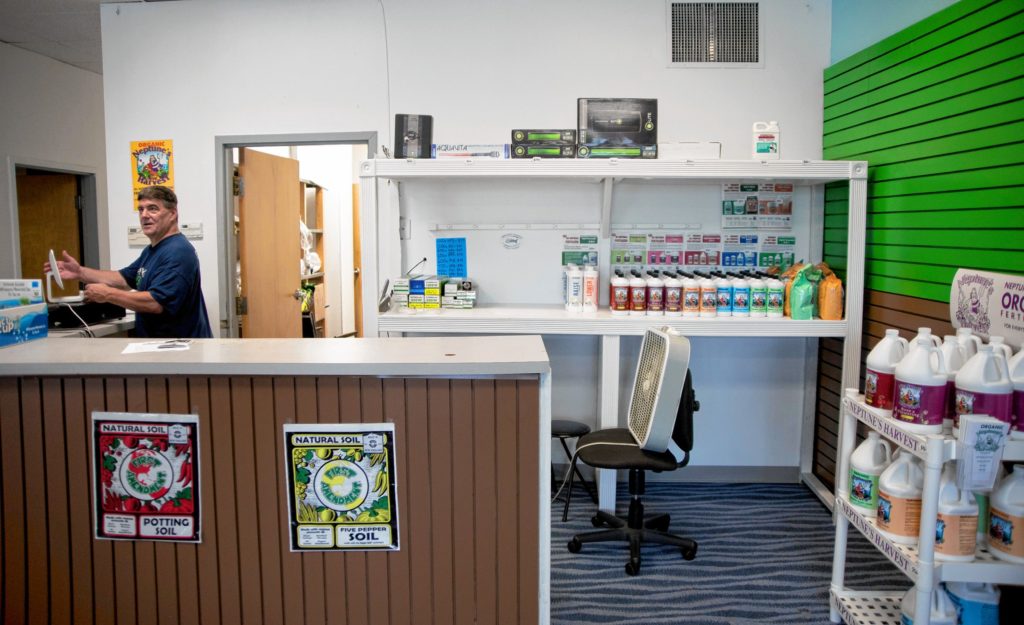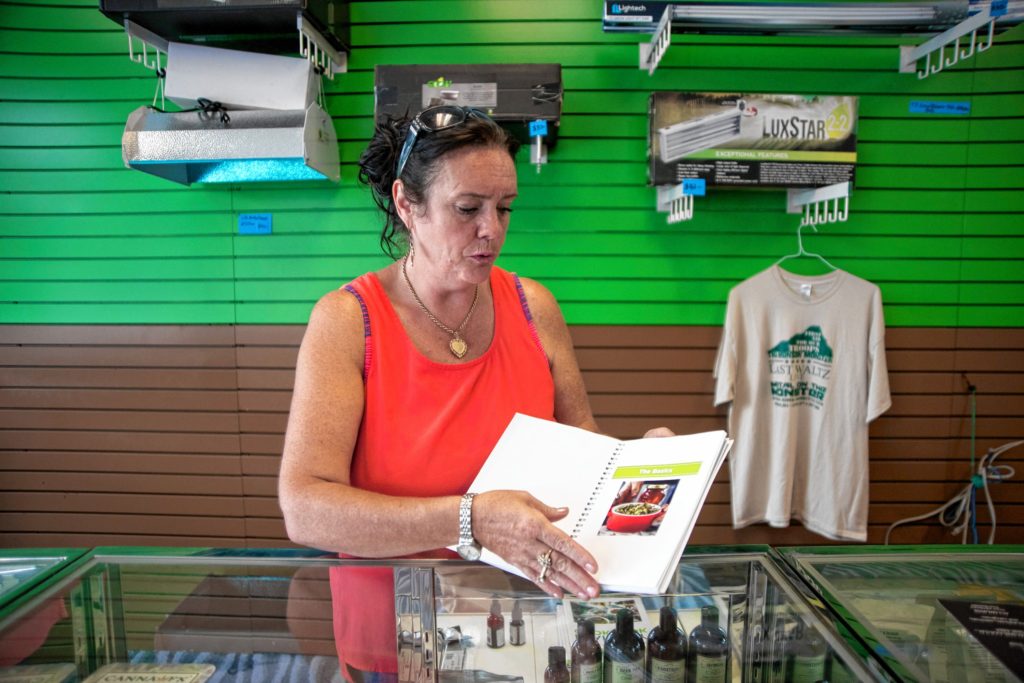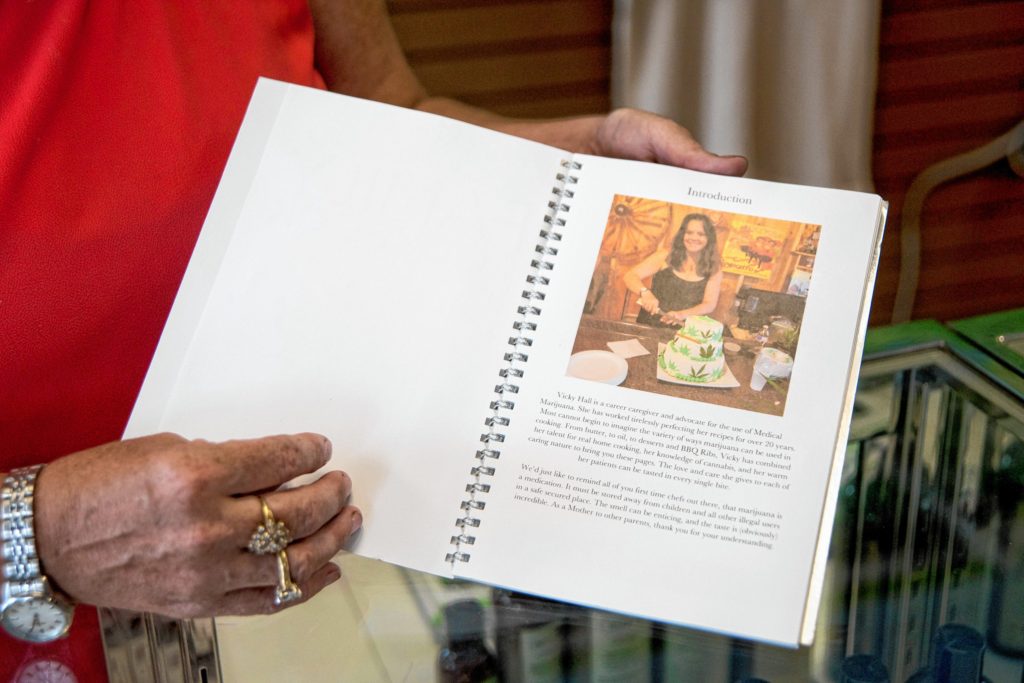Above a gray storefront on the corner of Sumner Avenue and Dickinson Street at the X in Springfield hangs a sign that reads, in leafy green letters, “Potco: Everything that goes in the POT…” Yes, “pot” is indeed written in all caps and followed by an ellipsis, conveying its meaning in no uncertain terms to even the squarest passerby.
Providers of growing equipment who once did business with a nudge and a wink are now losing their subtlety. And it’s about time, says Potco’s owner Dave Mech. He thinks it’s time people stopped stigmatizing the use of cannabis and start acknowledging that it’s helping people.
“With medical marijuana, people think that most people come in for pain. No. Eighty percent of the people are treated for anxiety and depression,” Mech says. “Because there are other drugs available to people for that and they have so many adverse effects, medical marijuana is the answer [for most of] of the people.”
Mech, previously a lawyer in the entertainment business, sees the legal and social tide turning for cannabis, and not a moment too soon. Medical marijuana, he says, could stem the tide of opioid addiction in the U.S. by treating chronic pain with the less addictive weed.
“That’s the whole thing, to coordinate care. I know people who’ve died because they were left to drop through the cracks,” Mech says. “Medical marijuana involves pretty much what is now being deemed complex care of patients, where they have usually more than one ailment, usually physical, and a psychological, and the depression that can go along with long-term injury.”
A glance at a few of the products in the large glass display case in front of Mech makes it immediately evident which patients he’s talking about. There are a few wooden rolling trays inset with the various insignias of branches of the U.S. military: the Marine Corps. and Navy emblems. Mech, who’s worked in the music business and is a passionate advocate for military families, recognized a need for better healthcare for veterans with physical injuries and PTSD. In 2007, he helped organize a benefit concert called First Aid for Our Troops. He filmed a documentary about it and, in the process, says he saw firsthand the struggles that returning vets deal with to get the care they need.
“I ended up going up to Walter Reed a lot,” he says. “Just all the soldiers there, they just put them on Percocet. They’re happy and scratchy, but I was [thinking], this is going to be a huge problem down the road. That was in 2009.”
Mech has very personal reasons, too, in seeking to proliferate the wider use of medical marijuana. He watched both of his parents die of cancer, he says, and he believes that medical marijuana could’ve helped ease their suffering. Recently, he had a loved one die of an overdose after becoming addicted to prescription drugs.
And he’s struggled with addiction himself. About 15 years ago, he was hit by a UPS truck. A few years later, he was struck in the spine by a ski lift. Since then, he’s had three separate surgeries for the three herniated disks in his back. During each recovery period he found himself addicted to Percocet, the opioid painkiller he was prescribed.
“[I] was eating so many Percocets,” Mech says. “I mean I couldn’t function. I had to get off of them. I had three surgeries, I had to get off them three different times. Anyone [who’s been through it] knows that is a living hell— and medical marijuana saved me … Now, I rely mostly on CBD products.”
CBD, an abbreviation for cannabidiol, is one of the two main active compounds in cannabis. It’s been shown to be therapeutically useful in animals in treating an array of chronic conditions, from epilepsy to inflammation to anxiety, though clinical trials in humans are still forthcoming. It doesn’t produce a high and Mech swears by it for the daily relief of his chronic pain. According to federal law, CBD itself is legal as long as it’s derived from cannabis plants which contain less than 0.3 percent THC, the other active compound in pot which is responsible for the high.
Violet Hall has been a caregiver to cancer patients for over 20 years and now runs Ora Care, a local company which produces CBD-infused food products for Potco.
“I think the community has realized that medical marijuana and CBD are a benefit to the community and health in all aspects,” she says. “They can get quality products without having harsh side effects which enhances their quality of life.”
“There’s a lot of people who won’t smoke marijuana,” Mech says. “The CBD business is going to be as big or bigger than marijuana in the future.”
Mech bills Potco, which opened in May, as “the Costco of pot.” His vision is to be the one-stop shop for medical cannabis patients. He says the system as it is now is messy and often results in a burden on medical marijuana patients. Potco also rents space to Community Health Clinics, which certifies eligible patients for the use of medical marijuana. He sees it as a way to make medical marijuana more accessible to the people that need it.
“You should be able to get your [grow] medium at the same place that you get other medical marijuana related products and see your doctor there,” Mech says. “It just seems like the future, the way all the big box stores are going.”
Eventually, Mech says he has ambitions to open Potco locations across the country, but the law will have to catch up first. Until then, he’s doing everything he can to stay on the leading edge of the emerging legal cannabis market.
A large black grow tent — with a few tomato plants inside, bathed in red light — is the centerpiece of the store, surrounded by bulbs, fans, tubing of various sizes, and a slew of other pieces of equipment sure to delight would-be pot cultivators. Big bags of soils, formulated to the needs to growers, are stacked up around the store. Still, there are a few conspicuous bare spots on the walls. It’s a work in progress, Mech says. He gestures to one side of the store, indicating the spot where he’s going to put in a dining area. It’s going to be called the Canna Cafe, he says, and he plans to serve CBD-infused donuts, coffee, and more to anyone that wants it. He says too that he’s confident he’ll be able to expand his offerings in December. Should a ballot measure pass this November legalizing the recreational use of marijuana, that’s when it would take effect in the state.
“It’s is a gateway drug,” Mech says. “A gateway to sobriety, a gateway to health.”
Contact Peter Vancini at pvancini@valleyadvocate.com.
MMMMM … CBD Donuts
Violet Hall smiles warmly as she sets down two trays of homemade donuts — honey-glazed and french cruller style — on the counter. She’s got a warm demeanor and a doting nature about her. “What can I get for you, love?” she asks a customer. It’s not surprising to find out that she cared for cancer patients for over 20 years. Now, she’s the owner of Ora Care, a business which produces foods infused with the cannabis derivative CBD, and she’s still passionate about patient care.
“This will give you no psychoactive effects,” she assures me. “But it will make you feel very good.”
I select a honey-glazed donut and sink my teeth into it, trying not to make a mess of myself. It has a light crunchy outside and is fluffy and warm on the inside. The honey glaze is sweet and sticky, with the immediately identifiable taste of cannabis. It’s pleasantly herbal, almost pine-y.
“What did you think of it?” she asks in a gentle Irish brogue. “Did you like it?”
It’s delicious, I tell her as I stuff the last bite into my face.
She smiles. “Wonderful! It’s one of these things you want to practice with to get it just right.”
There’s 25 milligrams of CBD in each donut, she says— a full daily dose. I’m lucky enough not to have too many aches and pains on a daily basis, but I’ll admit I’m probably a little more high-strung than the average person. I continue interviewing Dave Mech and Hall and, a few minutes later, I feel myself start to relax a little. It’s barely noticeable and it’s even possible that it’s a placebo effect, but I definitely feel clear-headed and less tense. As we’re finishing up the interview about an hour later, I’m still feeling at ease. Perhaps a little more hungry than usual, but that could be my imagination, too.
— PV

